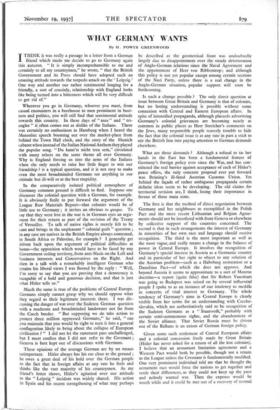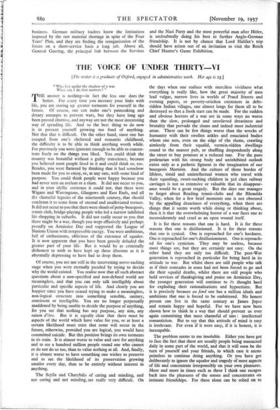WHAT GERMANY WANTS
By H. POWYS GREENWOOD
ITHINK it was really a passage in a letter from a German friend which made me decide to go to Germany again this autumn. " It is simply incomprehensible to me and certainly to all my countrymen," he wrote, " that the British Government and its Press should have adopted such an amazing attitude towards the torpedo attack on the ' Leipzig.' One way and another our rather sentimental longing for a friendly, a sort of cousinly, relationship with England looks like being turned into a bitterness which will be very difficult to get rid of."
Wherever you go in Germany, whoever you meet, from casual encounters in a beerhouse to men prominent in busi- ness and politics, you will still find that sentimental attitude towards this country. In these days of " axes " and " tri- angles " it, often comes out as dislike of the Italians. There was certainly no enthusiasm in Hamburg when I heard the Mussolini speech booming out over the market-place from behind the Town Hall clock, and the story of the Munich cabaret when instead of the Italian National Anthem they played the popular song. " Du kann'st nicht treu sein," circulated with many others on the same theme all over Germany. Why is England forcing us into the arms of the Italians when she only needs to raise her little finger to win our friendship ? is a typical question, and it is not easy to make even the most broadminded Germans see anything in our attitude but ill-will or at the best stupidity.
In the comparatively isolated political atmosphere of Germany common ground is difficult to find. Suppose one discusses the colonial question with a German, for example. It is obviously futile to put forward the argument of the League Raw Materials Report—that colonies would be of little use to Germany ; it invites an obvious to quogue. To say that they were lost in the war is in German eyes an argu- ment for their return as part of the revision of the Treaty of Versailles. To talk of native rights is merely felt to be cant and brings in the unpleasant " colonial guilt " question ; in any case are natives in the British Empire always contented, in South Africa or Palestine, for example ? I generally get driven back upon the argument of political difficulties at home—the opposition which would have to be faced by any Government ceding territory, from anti-Nazis on the Left and business interests and Conservatives on the Right. And then in a talk with a remarkably intelligent German who retains his liberal views I was floored by the reply : " Well, I'm sorry to say that you are proving that a democracy is incapable of a bold and generous decision, and that is just what Hitler tells us."
Much the same is true of the problems of Central Europe. Germans simply cannot grasp why we should oppose what they regard as their legitimate interests there. I was dis- cussing the danger of war over the Sudeten German question with a moderate and broadminded landowner not far from the Czech border. " But supposing we do take action to protect thiee million oppressed Germans," he said, " can you maintain that you would be right to turn it into a general conflagration likely to bring about the collapse of European civilisation ? " I did not let the statement pass unchallenged, but I must confess thit I did not refer to the Covenant ; Geneva is best kept out of discussions with Germans.
These opinions of the average German are by no means unimportant. Hitler always has his ear close to the ground ; he owes a great deal of his hold over the German people to the fact that in foreign affairs at any rate he feels and thinks like the vast majority of his countrymen. As my friend's letter shows, Hitler's agitation over our attitude to the " Leipzig " incident was widely shared. His action in Spain and his recent strengthening of what may perhaps be described as the geometrical front was undoubtedly largely due to disappointment over the steady deterioration of Anglo-German relations since the Naval Agreement and the appointment of Herr von Ribbentrop ; and although this policy is not yet popular except among certain sections of the Nazi Party, unless there is a real change in the Anglo-German situation, popular support will soon be forthcoming.
Is such a change possible ? The only direct question at issue between Great Britain and Germany is that of colonies, but no lasting understanding is possible without some connexion with Central and Eastern European affairs. In spite of intensified propaganda, although placards advertising Germany's colonial grievances are becoming nearly as common in public places as Herr Streicher's comments on the Jews, many responsible people scarcely trouble to hide the fact that the colonial issue is at any rate in part a stick to stir the British lion into paying attention to German demands elsewhere.
What are those demands ? Although a refusal to tie her hands in the East has been a fundamental feature bf Germany's foreign policy ever since the War, and has con- stituted the real barrier against acceptance of each of Hitler's peace offers, the only concrete proposal ever put forward was Briining's ill-fated Austrian Customs Union. Yet behind the facade of rather ambiguous propaganda certain definite ideas seem to be developing. The old claims for territorial revision are, I think, losing their importance in favour of three main aims.
The first is that the method of direct negotiation between Germany and her neighbours as exemplified in the Poliih Pact and the more recent Lithuanian and Belgian Agree- ments should not be interfered with from Geneva or elsewhere by collective support of the countries concerned. The second is that in such arrangements the interest of Germany in minorities of her own race and language should receive recognition. The third is the most important as well as the most vague, and really means a change in the balance of power in Central Europe. It involves the recognition of Germany's special interest in Austria as a Germanic country and in particular of her right to object to any solution of the Austrian problem—such as a Habsburg restoration or a Danubian Pact—of which she does not approve. And beyond Austria it seems to approximate to a sort of Monroe doctrine—a report (quite false) that Sir Robert Vansittart was going to Budapest was seized on by several influential people I spoke to as an instance of our tendency to meddle in concerns of vital interest to Germany. The whole tendency of Germany's aims in Central Europe is clearly visible from her terms for an understanding with Czecho- slovakia, which are authoritatively said to be recognition of the Sudeten Germans as a " Staatsvolk," probably with certain semi-autonomous rights, and the abandonment of the Soviet alliance. That Soviet Russia must be driven out of the Balkans is an axiom of German foreign policy.
Given some such settlement of Central European affairs and a colonial concession freely made by Great Britain (Hitler has never asked for a return of all the lost colonies), I believe that an armament limitation agreement and a Western Pact would both be possible, though not a return to the League unless the Covenant is fundamentally modified. One very prominent individual told me that he thought the armament race would force the nations to get together and settle their differences, as they could not keep up the pace and nobody wanted war. Then the expense would be worth while and it could be met out of a recovery of normal business. German military leaders know the limitations imposed by the raw material shortage in spite of the Four Years' Plan, and they are finding the reorganisation of the forces on a short-service basis a long job. Above all, General Goering, the principal link benveen the Services and the Nazi Party and the most powerful man after Hitler, is undoubtedly doing his best to further Anglo-German friendship. It is not by chance that Lord Halifax's trip should have arisen out of an invitation to visit the Reich Chief Hunter's Game Exhibition.

















































































































 Previous page
Previous page